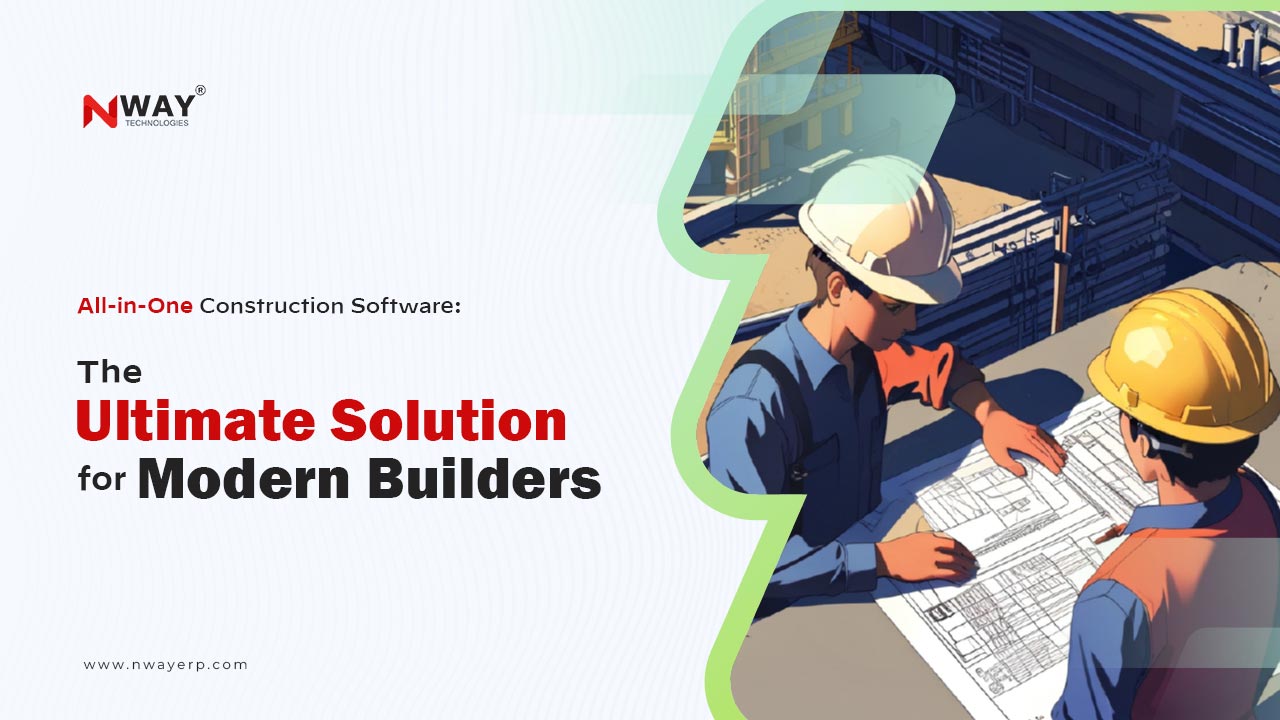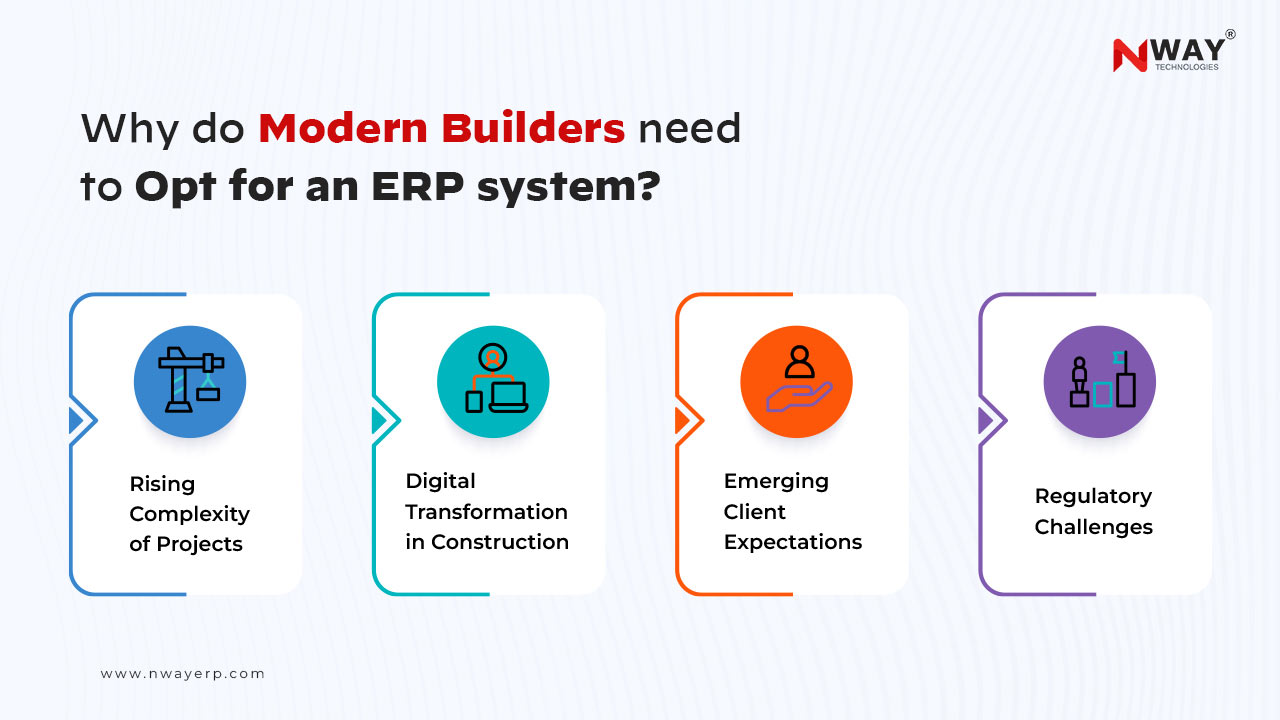The construction industry is one of the fastest-growing industries yet has its challenges. It involves complex project management, stringent deadlines, budget constraints, and coordination among various stakeholders. With the increasing scale and complexity of modern construction projects, an ERP system for construction companies helps in managing these tasks eliminating the traditional methods, it is considered as an All-in-One Construction Software that emerges as a complete solution.
Read this blog to delve deeply into the concept of all-in-one construction software, its features, benefits, and why it is the ultimate solution for modern builders, contractors, and subcontractors. Also, learn how it can help companies strive for efficiency, accuracy, transparency, and seamless management.
Key Takeaways
- Introduction
- How Construction ERP Works?
- Key Features
- Benefits
- Why do Modern Builders need to Opt for an ERP system?
- Real-World Applications
- Conclusion
How is ERP Software for Construction Works?
ERP software for construction companies works as a tool that provides digitalization to integrate and streamline every aspect of a construction project. From project planning to execution, budgeting, resource management, and reporting. It provides a centralized hub to solve all the construction operations from anywhere at any time. It also enhances collaboration, reduces errors, and boosts productivity.
Key Features of All-in-One Construction Software
Here are some of the features that construction ERP software provides:
Project Management Tools
Task Scheduling: Assign tasks with timelines, ensuring their responsibilities.
Gantt Charts: Visualize project timelines and milestones to track progress.
Real-time Updates: Enable dynamic adjustments to plan as situations evolve.
Budgeting and Cost Management
Cost Estimation: Generate accurate estimates and project cost forecasts.
Expense Tracking: Monitor expenditures in real-time to avoid overspending.
Profitability Insights: Assess project performance and increased profitability with detailed financial reports.
Resource Management
Material Tracking: Ensure timely procurement and usage of materials.
Equipment Monitoring: Track the utilization and maintenance of equipment and machinery.
Labor Allocation: Optimize workforce deployment based on project needs.
Document Management
Centralized Storage: Storage blueprints, contracts, and other documents in one place.
Version Control: Access updated files without confusion.
Easy Sharing: Share files effectively with multiple stakeholders.
Communication and Collaboration
Team Messaging: Enable instant communication among team members.
Stakeholder Access: Share project updates with clients, vendors, and contractors.
Issue Tracking: Identify and resolve issues collaboratively.
Reporting and Analytics
Customizable Dashboards: View key performance indicators (KPIs) at a glance.
Progress Reports: Generate detailed project status reports.
Predictive Analytics: Anticipate risks and opportunities using data insights.
Compliance and Safety Management
Regulatory Compliance: Ensure adherence to local building regulations.
Safety Protocols: Manage safety checklists and incident reports.
Audit Trails: Maintain detailed records for accountability.
Benefits of Using an All-in-One Construction Software
01. Enhanced Efficiency
Eliminate repetitive tasks, such as scheduling and reporting, saves time, and reduces manual errors, allowing teams to focus on strategic activities.
02. Improved Collaboration
With a centralized platform, stakeholders can collaborate effectively, reduce miscommunication, and ensure everyone is aligned.
03. Cost Savings
By optimizing resource allocation, monitoring budgets, and minimizing wastage, the software helps control costs and improve efficiency.
04. Real-time Insights
Access to real-time data enables quick decision-making, ensuring projects stay on track.
05. Scalability
As your business grows, the software adapts to your needs, managing multiple projects effortlessly.
06. Risk Mitigation
With predictive analytics and compliance tools, potential issues can be identified and addressed quickly.
Why do Modern Builders need to Opt for an ERP system?
01. Rising Complexity of Projects
Construction projects today are larger and more complex than ever before, they require modern tools to manage diverse operations simultaneously.
02. Digital Transformation in Construction
With industries worldwide adopting digital transformation, the construction industry is no exception. An all-in-one software ensures builders stay competitive and connected with modern technology.
03. Emerging Client Expectations
Modern clients demand transparency and timely updates, which the software facilitates through its communication and reporting features.
04. Regulatory Challenges
Meeting stringent requirements is simplified with built-in compliance tools, saving time and avoiding penalties.
Real-World Applications of All-in-One Construction Software
01. Residential Construction
A housing developer used all-in-one software to manage multiple projects simultaneously, resulting in timely completion and cost savings of 15%.
02. Commercial Projects
A commercial contractor leveraged the software to coordinate between architects, engineers, and suppliers, enhancing collaboration and reducing errors by 20%.
03. Infrastructure Development
An infrastructure company utilized the platform to ensure compliance with government regulations, streamline workflows, and achieve a 25% reduction in project delays.
Conclusion
The construction industry is demanding and involves various facets that need to be managed efficiently. All-in-one construction software helps empower modern builders, contractors, subcontractors, and managers to overcome challenges, enhance productivity, and achieve excellence in their projects.
By centralizing operations, fostering collaboration, and delivering real-time insights, it helps as the ultimate solution for builders who want to stay ahead of the competition.
Investing in such a tool not only helps ensure the successful execution of projects but also lays the foundation for sustainable growth and long-term success. So how are you managing your construction projects in the long run? Do you have software that can entirely manage the construction operations? If not, you can opt for NWAY All-in-one Construction Software that can streamline, optimize, and digitize all your construction projects using a centralized platform. Request a demo now to learn more from one of our experts.




